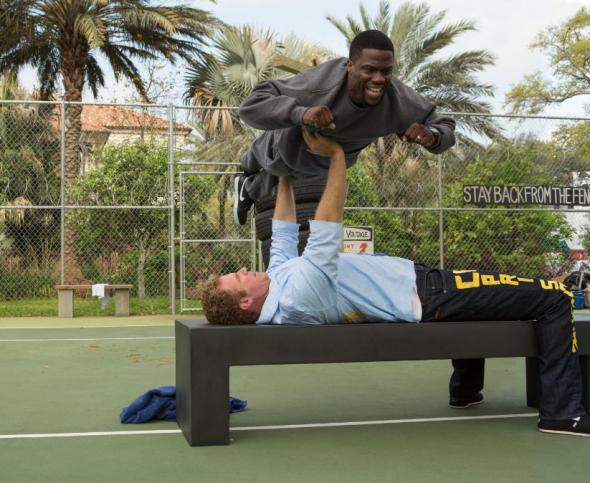The reports are true: Get Hard is homophobic and racist—the entire premise is based on a fear of prison rape and an assumption that all black males have been to prison—and definitely not funny. Stars Will Ferrell and Kevin Hart, as well as director and co-writer Etan Cohen (who wrote Tropic Thunder and makes his directorial debut here) have seemed genuinely taken aback by this near-universal critical reaction in the days since the film premiered at South by Southwest. “Any time you’re going to do an R-rated comedy, you’re going to offend someone,” Ferrell has said. “But that’s kind of what we do. We provoke. We prod. We also show a mirror to what’s already existing out there.”
Which is fine, except Get Hard fails to do that last bit. Instead of reflecting societal attitudes and sharply commenting on them, it just perpetuates them. But there is one joke that manages to be truly subversive in the way that the entire film was apparently intended to be, and it’s all thanks to Boyz n the Hood.
In one scene, Darnell brings James over to have dinner with his wife and daughter, Rita and Mikayala. Rita isn’t happy that Darnell is pretending to have gone to prison and goads him into telling James the story of how he got “locked up.” Darnell, in a bind, begins to tell his story, which is … exactly the plot of John Singleton’s breakthrough 1991 hit (with a slight twist on the ending of the story—Darnell takes the rap for Doughboy, after he goes after Ricky’s murderer).* James, being exactly the kind of doofy, un-self-aware white guy that Ferrell has spent years mastering, is fully wrapped up in the story and doesn’t doubt it for a minute. “Sounds just like a movie,” James says, clearly impressed.
Now, this isn’t the most original or funniest joke ever to be made about the cultural divide between white and black culture, but the bar for Get Hard is so incredibly low that this chuckle-worthy moment is undoubtedly the highlight. And it’s actually making an intelligent point about the way in which Hollywood, and white audiences especially, often feed off of the turmoil and violence found in some black communities while ignoring the more benign, tamer aspects of being black. Unlike the rest of the film, James (and mainstream society) are truly the butts of the joke here, without making Boyz n the Hood—a genuinely good film about a certain demographic of black culture in a very specific time—feel like the unintended target.
It’s too bad the rest of Get Hard feels nowhere near as subversive as this isolated scene, instead doing exactly what it satirizes. In an interview with HitFix, Ferrell defends the homophobic premise, saying, “We didn’t come up with those fears, they’re just a societal norm. So that’s where the comedy comes from.” Yet nothing is done with those “societal norms”: Stereotypes are thrown about haphazardly, without any true examination of what they mean. By the end of the movie, for instance, the atmospheric fear of homophobia is just as potent as was is at the beginning: Recalling all of Darnell’s anal sex references, a defeated James is suddenly invigorated—the prospect of prison rape empowering him to take down his adversary—like Popeye guzzling down spinach. And James later “assimilates” into the black gang culture of Darnell’s cousin (played by T.I.) in multiple scenes that are about as lame as any moment from Jamie Kennedy’s white-guy-acting-black “comedy” Malibu’s Most Wanted. But there’s never any indication that James has learned that there are many other black people besides his newly acquired friend Darnell, who are not innately “thugs.”
Truly subversive satire is clear about criticizing societal norms, as Mel Brooks did so well with his racist western town in Blazing Saddles. But save for one brief moment, Get Hard’s jokes about homophobia and racism are too blurry to have much impact at all.
*Correction, March 27, 2015: This post originally identified director John Singleton as James Singleton.
